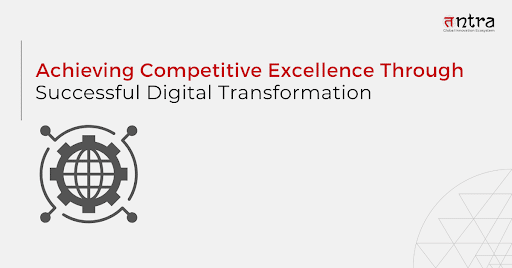
Achieving Competitive Excellence through Successful Digital Transformation
Digital transformation isn’t just about tech. Leaders must champion the change, invest in employee training, and embrace clear communication. Updating workflows and becoming agile is also crucial. Businesses need to prepare for a digital workforce. Getting ready for digital transformation success requires implementing the best practices from all ends. This blog highlights the 5 major factors that can help to maintain and elevate the success of a digital transformation strategy. Read more to know the details.
DHL’s plan for 2025 aims to deliver excellence in the digital age. The COVID-19 pandemic has accelerated the company’s efforts to digitize. It will invest more than $2 billion in a digital transformation strategy during 2021 and 2025.
Millions of items are delivered worldwide via numerous logistics systems, various providers, and a multitude of touchpoints. How can one make meaning out of this? DHL invests in a cutting-edge Advanced Quality Control Centre. Its primary functions include understanding large data to do predictive studies on deliveries, real-time issues, and shipment/flight movements. The AQCC continuously adjusts and improves itself using Artificial intelligence (AI) and Machine Learning.
The company also employs 24/7 chatbots to obtain real-time parcel tracking information, On-Demand Delivery, which allows consumers to arrange when they want their products delivered, and QR-code labels for parcel returns, which reduces physical touch. The company’s digital transformation journey followed the whole operational lifecycle.
(Source: Yenlo)
The New Age Landscape of Digital Transformation
According to Prophet, market forces are the primary drivers of the digital transformation plan, with 51% of efforts resulting from growth possibilities and 41% from greater competitive pressure. With high-profile data breach stories in the spotlight on a daily basis, new regulatory standards such as GDPR are also driving 38% of organizations to adapt.
According to Gartner, 91% of organizations are pursuing some type of digital project, and 87% of top business leaders consider digitalization a priority. The growing importance of the digital transformation framework is visible across companies of all shapes and sizes. The investment in these initiatives is likely to grow over the next decade.
54% of transformation efforts will regularly concentrate on improving touchpoint interactions and 45% on enabling infrastructure, but 41% of companies failed to perform their due diligence in terms of understanding their customers and have invested in digital transformation with no direction of thorough customer research.
How to Sustain Digital Transformation Success
Experts agree that successful digital transformation initiatives need an organized plan and knowledge throughout the organization. Utilizing digital technologies is only one part of the puzzle. When it comes to creating transformative success, it’s critical to have the right leaders in place, invest in personnel and skill development, implement cultural and behavioral changes, ensure regular and straightforward communication, and digitize tools and processes.
Here are a few ways companies can build and sustain their digital transformation success –
- Continuous Team Guidance
To be effective, digital transformation must be implemented across all teams and departments. To successfully navigate the process, teams from HR, finance, purchasing, marketing, and product must be open-minded and prepared for the effect of data, design, and technology.
One of the most significant components contributing to the success of such a change is the company’s capability to strengthen the whole team across the business on this path, even if it involves using external digital transformation companies. Even here, design thinking plays an important role in engaging the business around a shared vision and purpose. - Get Buy-in From the C-Level
Clear backing and encouragement may make a big difference in receiving the funds and attention that the transformation program needs. But traditional businesses are simply wired differently. Their expertise and work method continue to be incompatible with digitisation since they are built on wide management evaluation processes that frequently function in the opposite direction of digital product development. They need to hire experts in digital transformation services to get over these blockages.
When a company’s senior leadership invests in transforming its operations, great momentum spreads throughout the organization. The first efforts must be successful, especially during the initial phases of the change. Senior-level support can provide the necessary accountability and visibility to maintain the momentum surrounding the transformation. - Eliminate the obsolete
Many aspects of any major organization are governed by embedded processes and policies. However, many digital transformation solutions result in workflow modifications that replicate current procedures or violate existing regulatory policies, failing to deliver the expected benefits while staying compliant with regulations.
Ensure that your team includes personnel who are in charge of anticipating such effects and changing or waiving policies and workflows ahead of time so that users can embrace the modified systems with confidence. Keep in mind that this will most likely happen in stages, with incremental releases leading up to the end-state transformation. - Agility and Resilience are essential
Using an agile methodology during the transformation journey results in a high level of success. Regular, incremental, consumable releases that are rapidly field-tested provide input on whether your project strategy is still on track. This “fail fast” method informs you of any market changes that you did not foresee, as well as technological advancements that may give greater benefits.
It’s no secret that technology is evolving at a rapid speed, making it difficult to satisfy the demands of the day, such as doctors adopting Artificial Intelligence (AI) to analyze data fast and effectively to diagnose patients. The route from vision to result may prove long and difficult. Only when novel tools are in the control of competent experts can you feel confident. - Reorient the workplace
Success necessitates both digitally knowledgeable executives and staff capable of implementing the changes required for a digital transformation to succeed. Digitization, automation, and other technology advancements will have a substantial impact on the workforce, necessitating investments in and hiring for radically changing skills and capabilities.
Whether or not an organization has already initiated a digital transformation, it is crucial for all organizations to consider how digitization may affect their businesses in the short and long term, as well as the skills required to keep up. One key element is for companies to define clear workforce strategies to assist in determining the digital skills and capabilities that they already possess—and will require—to accomplish their future ambitions.
The Bottom Line: Digital Transformation Success can be Sustained
Implementing digital transformation does not have to be a difficult or disastrous process. Incorporating new technologies into your company’s ongoing success is doable with a robust digital transformation strategy that incorporates the entire company and prioritizes communication, clarity, and consistent, measurable, and achievable progress.
If you are looking for a digital transformation partner for your business, Tntra can help. As a leading software product engineering company, we can augment your operations by digitizing your business from A to Z. Book your FREE CONSULTATION CALL today!




